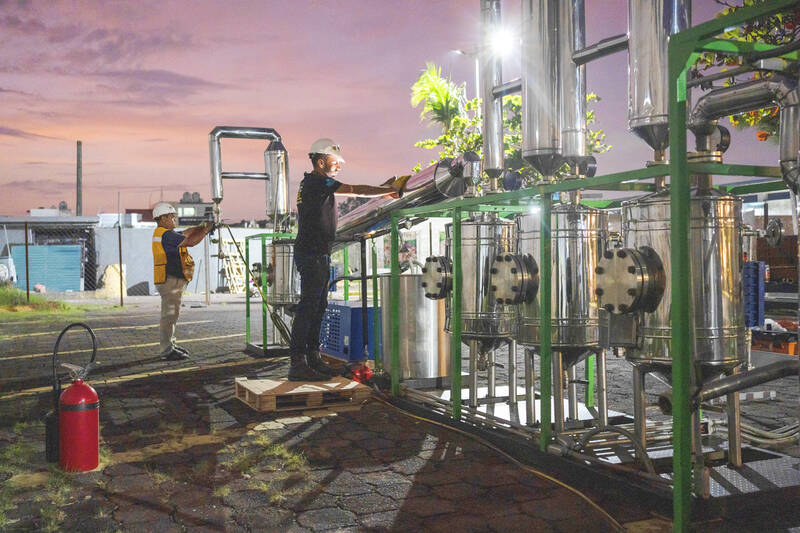A start-up in Mexico is trying to help get a handle on one coastal city’s plastic waste problem by converting it into gasoline, diesel and other fuels.
With less than 10 percent of the world’s plastics being recycled, Petgas’ idea is that rather than letting discarded plastic become waste, it can become productive again as fuel.
Petgas developed a machine in the port city of Boca del Rio that uses pyrolysis, a thermodynamic process that heats plastics in the absence of oxygen, breaking it down to produce gasoline, diesel, kerosene, paraffin and coke.

Photo: AP
Petgas chief technology officer Carlos Parraguirre Diaz said that in a week, the machine can process 1.36 tonnes of plastics and produce 1,350 liters of fuel.
The process requires propane to initiate the heating, but once the pyrolysis begins, the gas it produces is used to keep it going, the company said.
Using fuel it produces does emit carbon dioxide, but the company says its net impact is less than comparable fuels because their fuel is lower in sulfur.
Parraguirre Diaz said the machine shows that “we can transform that [plastic] into a product that’s useful and has high value in the world economy.”
“In place of having a dump, it’s as if we dug into the earth and found hydrocarbons that can be used by our community,” he said.
Global plastic production, at already about 400 million tonnes annually, could surge by 70 percent by 2040 without policy changes, the UN has said.
China was by far the biggest exporter of plastic products in 2023, followed by Germany and the US.
Many plastics are used for packaging. Every day, the equivalent of 2,000 garbage trucks full of plastic are dumped into the world’s oceans, rivers and lakes.
Negotiations on a treaty to end plastic pollution concluded in Busan, South Korea, in December last year without reaching an agreement. That was supposed to be the fifth and final round to produce the first legally binding treaty on plastics pollution, including in the oceans, by the end of last year.
Petgas envisions a circular economy in which plastic is no longer waste, but rather a resource for the production of fuel.
To that end, the company has organized plastic collection drives to remove bottles and other material from the city’s beaches. It encourages people to bring plastic waste to a drop-off point and receives most of its material clean and shredded from a recycler.
Alexa Mendoza, a biologist specializing in plastic contamination of the sea who is not involved in the project, said that Petgas’ plan was a good initiative, but a “band-aid” for a massive global problem.
“It doesn’t seem to me a solution to put a band-aid on it and say: ‘Great, it’s solved and let’s do it,’ but rather it could be a first step,” Mendoza said. “From there, with the help of scientists, you could take into account what needs to be adjusted so that it doesn’t become another source of pollution.”
For now, Petgas donates the fuel it produces to the local fire department and food delivery services.
“The future is being able to really take production to a scale that has impact,” Parraguirre Diaz said.

DIVIDED VIEWS: Although the Fed agreed on holding rates steady, some officials see no rate cuts for this year, while 10 policymakers foresee two or more cuts There are a lot of unknowns about the outlook for the economy and interest rates, but US Federal Reserve Chair Jerome Powell signaled at least one thing seems certain: Higher prices are coming. Fed policymakers voted unanimously to hold interest rates steady at a range of 4.25 percent to 4.50 percent for a fourth straight meeting on Wednesday, as they await clarity on whether tariffs would leave a one-time or more lasting mark on inflation. Powell said it is still unclear how much of the bill would fall on the shoulders of consumers, but he expects to learn more about tariffs

NOT JUSTIFIED: The bank’s governor said there would only be a rate cut if inflation falls below 1.5% and economic conditions deteriorate, which have not been detected The central bank yesterday kept its key interest rates unchanged for a fifth consecutive quarter, aligning with market expectations, while slightly lowering its inflation outlook amid signs of cooling price pressures. The move came after the US Federal Reserve held rates steady overnight, despite pressure from US President Donald Trump to cut borrowing costs. Central bank board members unanimously voted to maintain the discount rate at 2 percent, the secured loan rate at 2.375 percent and the overnight lending rate at 4.25 percent. “We consider the policy decision appropriate, although it suggests tightening leaning after factoring in slackening inflation and stable GDP growth,”

Meta Platforms Inc offered US$100 million bonuses to OpenAI employees in an unsuccessful bid to poach the ChatGPT maker’s talent and strengthen its own generative artificial intelligence (AI) teams, OpenAI CEO Sam Altman has said. Facebook’s parent company — a competitor of OpenAI — also offered “giant” annual salaries exceeding US$100 million to OpenAI staffers, Altman said in an interview on the Uncapped with Jack Altman podcast released on Tuesday. “It is crazy,” Sam Altman told his brother Jack in the interview. “I’m really happy that at least so far none of our best people have decided to take them

As they zigzagged from one machine to another in the searing African sun, the workers were covered in black soot. However, the charcoal they were making is known as “green,” and backers hope it can save impoverished Chad from rampant deforestation. Chad, a vast, landlocked country of 19 million people perched at the crossroads of north and central Africa, is steadily turning to desert. It has lost more than 90 percent of its forest cover since the 1970s, hit by climate change and overexploitation of trees for household uses such as cooking, officials say. “Green charcoal” aims to protect what